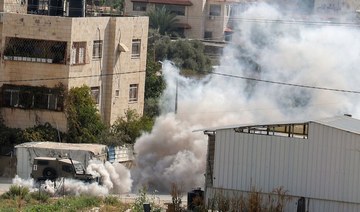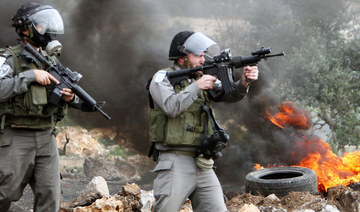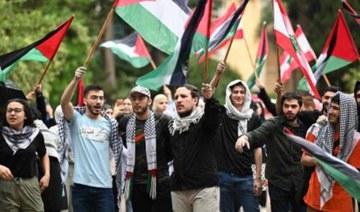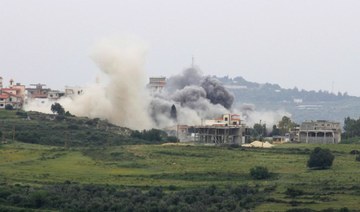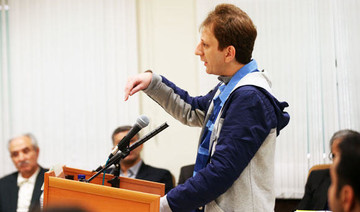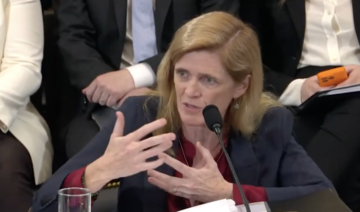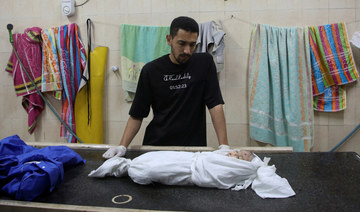JERUSALEM: Israeli forces were hunting the assailant behind an attack that killed a soldier at an east Jerusalem checkpoint, authorities said Sunday, hours after two Palestinian teenagers were shot dead in an Israeli raid in the occupied West Bank.
The Israeli army said a soldier had been “killed as a result of being critically injured by a shooting attack” that police said had taken place at a checkpoint in Israeli-annexed east Jerusalem near Shuafat Palestinian refugee camp.
Another Israeli had been “severely injured,” police said, and a third person, whose nationality was not specified, was hit by “shrapnel” in the incident, according to emergency services group Magen David Adom (MADA), which said all gunshot victims were in their 20s.
Police cordoned off the area near the checkpoint and dozens of officers had been deployed at the entrance and exit of east Jerusalem, while the Palestinian Red Crescent Society said its medics were being prevented from entering the refugee camp.
Israeli Prime Minister Yair Lapid described the shooting as a “severe” attack.
“My heart is with the wounded and their families this evening. Terror will not defeat us, we are strong even on this difficult evening,” he said in a statement.
Earlier Saturday, two Palestinian teenagers were shot dead in an operation by Israeli forces in Jenin, the flashpoint northern city in the occupied West Bank.
The Palestinian health ministry announced the killing of “two citizens by occupation (Israeli) bullets in Jenin,” as Israeli troops carried out an arrest there. Eleven others were also wounded.
Those killed were named by the Palestinian health ministry as Ahmad Daraghmeh, 16, and Mahmoud as-Sous, 18. Islamic Jihad praised the teenagers as “its martyrs.”
Israel’s military said troops entered Jenin on Saturday to detain a 25-year-old Palestinian it said was a member of the Islamic Jihad militant group and suspected of shooting at troops in the area.
“During the activity, dozens of Palestinians hurled explosive devices and Molotov cocktails at IDF soldiers and shots were fired at them,” an army statement said, adding that soldiers fired at “the armed suspects.”
Saturday’s incident is the latest in a series of frequent and often deadly raids by Israel’s army targeting Palestinian militants, which have left dozens of both Palestinian fighters and civilians dead.
Following the latest deaths in Jenin, the Palestinian presidency called on Washington to “exert serious pressure on Israel to stop its all-out war against our Palestinian people.”
Israeli action “will push matters toward an explosion and a point of no return, which will have devastating consequences for all,” said Nabil Abu Rudeineh, spokesman for president Mahmud Abbas, in a statement published by the official Palestinian news agency Wafa.
The agency also reported Israeli forces fired directly at journalists during the Jenin raid.
Two reporters were wounded Wednesday while covering a military operation witnessed by an AFP journalist near the West Bank city of Nablus, in which one Palestinian was killed.
In March, Palestinian-American journalist Shireen Abu Akleh was shot dead while covering an Israeli raid in Jenin.
Saturday’s violence in Jenin comes a day after two other Palestinian teenagers were shot dead by Israeli forces, according to the health ministry — Adel Dawoud, 14, killed in the northern West Bank, and Mahdi Ladadweh, 17, killed near the city of Ramallah.
“I am alarmed by the deteriorating security situation, including the rise in armed clashes between Palestinians and Israeli security forces in the occupied West Bank, including East Jerusalem,” Tor Wennesland, the UN’s Special Coordinator for the Middle East Peace Process, said in a statement.
Israel has occupied the West Bank since the 1967 Six-Day War and around 475,000 Israelis now live in settlements across the territory, which are considered illegal by most of the international community.
They live alongside some 2.8 million Palestinians, who in different areas of the West Bank are subject to Israeli military rule or limited Palestinian governance.
Israeli forces hunt east Jerusalem checkpoint attacker
https://arab.news/wbrg6
Israeli forces hunt east Jerusalem checkpoint attacker
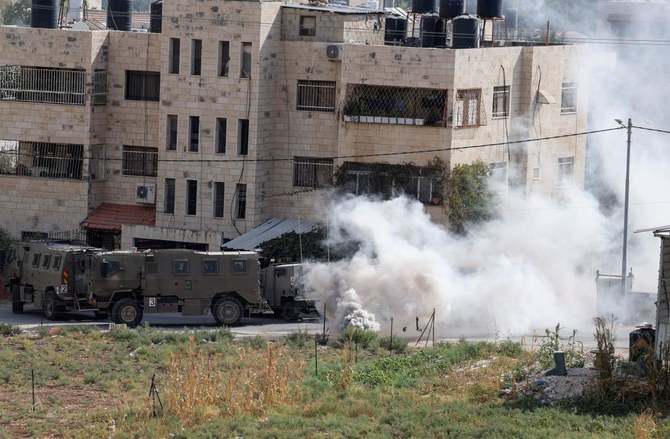
- Dozens of officers had been deployed at the entrance and exit of east Jerusalem
- Israeli Prime Minister Yair Lapid described the shooting as a “severe” attack
UNICEF demands immediate ceasefire in southern Lebanon, protection of children

- Israeli airstrikes destroy houses, wounding individuals
- Students from the American University of Beirut and the Lebanese American University in Beirut called on their administrations “to boycott companies and institutions supporting Israel”
BEIRUT: Lebanon’s Disaster Risk Management Unit announced that the total death toll from Israeli attacks since Oct. 8 has reached 438 people.
According to the latest report issued by the Lebanese Ministry of Health, eight children were among the dead and 75 children were among the 1,359 people injured since the escalation of hostilities.
The UN Children’s Fund expressed its concern over “the continuing hostilities in southern Lebanon that are taking a devastating toll on the population, forcing around 90,000 people, including 30,000 children, from their homes.”
UNICEF called for “an immediate ceasefire and the protection of children and civilians,” and indicated that “the increase in armed conflict has damaged infrastructure and civilian facilities, causing severe damage to basic services that children and families depend on, including nine water stations serving 100,000 people at least.
“More than 70 schools are currently closed, affecting around 20,000 students and significantly affecting their education. Around 23 healthcare facilities — serving 4,000 people — are closed due to the hostilities.”
UNICEF’s representative to Lebanon, Edouard Beigbeder, expressed the organization’s deep concern. “As the conflict impacting the south of Lebanon is in its seventh month, we are deeply alarmed by the situation of children and families who have been forced from their homes and the profound long-term impact the violence is taking on children’s safety, health, and access to education.
“As long as the situation remains unstable to this extent, more children will suffer,” Bigbeder warned. “Protection of children is an obligation under the International Humanitarian Law and every child deserves to be safe.”
In a statement, UNICEF indicated that before the outbreak of the conflict, basic services in Lebanon, including health and education systems, were in danger of collapsing after years of overwork. The unprecedented economic and financial crises that have hit the country since 2019 have exacerbated existing economic vulnerabilities.
Following the displacement of residents from the southern border region, UNICEF, in collaboration with its partners, has been providing “crucial aid to affected families seeking refuge in shelters. Emergency cash assistance, facilitated in partnership with the Ministry of Social Affairs, has been extended to meet the immediate needs of 85,000 individuals. Some displaced children have managed to resume their education in official schools, receiving essential supplies and transportation support.”
On Tuesday, hostilities persisted intermittently on the southern front between Hezbollah and the Israeli military.
An Israeli airstrike targeted a house along the Kafr Kila — Al-Adisa road, destroying it and causing severe damage to nearby properties and homes. Additional Israeli airstrikes struck homes and commercial establishments in the towns of Aita Al-Shaab, Yaroun, Jebbayn, the outskirts of Naqoura, Alma Al-Shaab, and Jabal Al-Labouneh.
In solidarity with Gaza and echoing student activism in US universities, Lebanese university students organized sit-ins on campus or nearby areas, brandishing Lebanese and Palestinian flags and demanding the liberation of Palestine and a cessation of attacks on southern Lebanon.
Students from the American University of Beirut and the Lebanese American University in Beirut called on their administrations “to boycott companies and institutions supporting Israel.”
Similar demonstrations unfolded in several private universities across Lebanon, including Beirut Arab University, Lebanese International University, Saint Joseph University, Haigazian University, and Holy Spirit University of Kaslik.
Iran commutes a tycoon’s death sentence to 20 years in prison
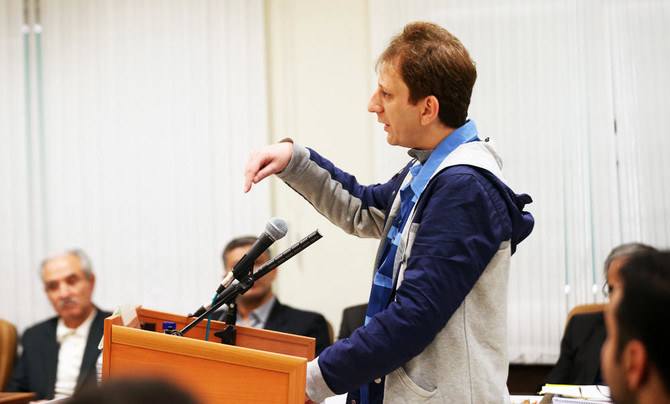
- Babak Zanjani was sentenced to death in 2016 over a number of charges
- An appeal for amnesty by Zanjani was reviewed and his death sentence was “commuted to a 20-year prison term
TEHRAN: Iran’s judiciary said Tuesday that it commuted a death sentence for a tycoon to 20 years in prison after he returned around $2.1 billion in assets from illegally selling oil abroad, the official IRNA news agency reported.
Babak Zanjani, 48, was sentenced to death in 2016 over a number of charges, including money laundering, forgery and fraud that disrupted the country’s economy.
IRNA quoted judiciary spokesman Asghar Jahangir as saying that an appeal for amnesty by Zanjani was reviewed and his death sentence was “commuted to a 20-year prison term after approval by the Supreme Leader.”
Ayatollah Ali Khamenei has the final say on all state matters and occasionally issues pardons.
Jahangir said as part of Zanjani’s 2016 sentence, he had the right to an amnesty or commutation of his death sentence if he returned the assets, compensated for damages and expressed regret for wrongdoing. The spokesman said that Zanjani cooperated with the judiciary to locate the assets abroad in recent years while he was in prison, and all the money was returned.
Zanjani was arrested in 2013 shortly after the election of then President Hassan Rouhani as part of a crackdown on alleged corruption during the rule of former President Mahmoud Ahmadinejad.
Authorities said then that Zanjani owed more than 2 billion euros ($2.1 billion) for oil sales he made on behalf of Ahmadinejad’s government. Zanjani was one of Iran’s wealthiest businessmen, with a fortune worth an estimated $14 billion.
The commutation of Zanjani’s sentence indicates that Iran’s government is in need of revenue after years of US sanctions on the country.
In 2018, then President Donald Trump pulled the US out of a nuclear deal with Iran that had aimed to lift sanctions on Iran in return for the capping of the country’s nuclear activities. Since then, Iran has found it difficult to sell its crude, the country’s main source of foreign revenue. After Trump’s unilateral withdrawal from the deal, Iran’s rial currency tumbled.
In 2014, Iran executed another billionaire businessman, Mahafarid Amir Khosravi, for a $2.6 billion state bank scam in Iran.
UN chief says ‘incremental progress’ toward averting Gaza famine
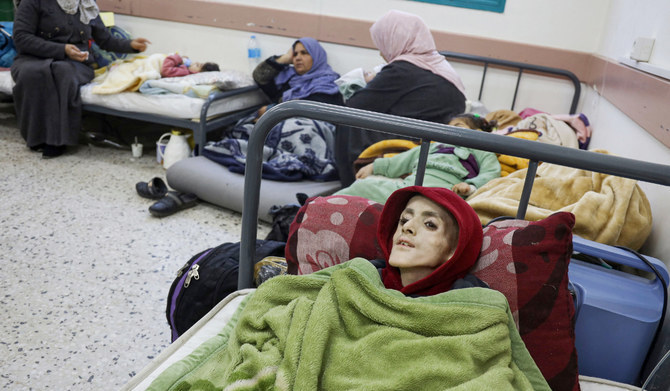
- Guterres said a major obstacle to distributing aid across Gaza is a lack of security for aid workers and civilians
UNITED NATIONS: United Nations Secretary-General Antonio Guterres on Tuesday said there has been “incremental progress” toward averting “an entirely preventable, human-made famine” in the northern Gaza Strip, but much more is urgently needed.
He specifically called on Israel to follow through on its promise to open “two crossing points between Israel and northern Gaza, so that aid can be brought into Gaza from Ashdod port and Jordan.”
Guterres also told reporters that a major obstacle to distributing aid across Gaza is a lack of security for aid workers and civilians.
“I again call on the Israeli authorities to allow and facilitate safe, rapid and unimpeded access for humanitarian aid and humanitarian workers, including UNRWA, throughout Gaza,” he said.
Houthis claim attacking US, Israeli ships
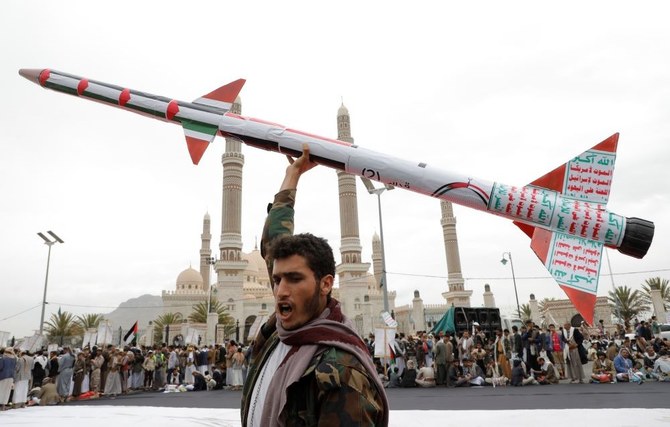
- Houthi military spokesperson Yahya Sarea said that their armed forces launched a number of explosive-laden drones at two US Navy warships in the Red Sea
- Militia also targeted the MSC Orion commercial ship with drones in the Indian Ocean
AL-MUKALLA: Yemen’s Houthi militia has claimed responsibility for four strikes on international commercial and navy ships in the Red Sea and Indian Ocean, including one on a ship destined for Oman.
Houthi military spokesperson Yahya Sarea said on Tuesday that their armed forces launched a number of explosive-laden drones at two US Navy warships in the Red Sea and targeted the MSC Orion commercial ship with drones in the Indian Ocean, which they claimed was related to Israel.
The MSC Orion is a container ship flying the Portuguese flag and traveling from Portugal’s Sines port to Oman’s Salalah port, according to websites that provide information on ship whereabouts and identities.
Oman is one of few nations to host Houthi officials, and its delegations have visited Houthi-controlled Sanaa to push for peace in Yemen.
The Houthis said they also targeted the Cyclades commercial ship for reaching the Israeli Eilat port on April 21, violating earlier instructions to ships in the Red Sea not to go to Israel.
Since November, more than 100 ships sailing in the Red Sea, Bab Al-Mandab Strait, and Gulf of Aden have been attacked by hundreds of drones and ballistic missiles fired by the Houthis in support of the Palestinian people against Israel’s bombardment of Gaza.
The Houthi assaults have prompted the US to organize an alliance of naval task forces and start airstrikes on Houthi-controlled areas of Yemen.
The US Central Command said in a statement that the Houthis fired on Monday three anti-ship ballistic missiles and three drones from areas under their control at the MV Cyclades, which it said is owned by Greece and sails under the flag of Malta, with no reported damage to the ship.
Also on Monday, US CENTCOM forces destroyed one airborne unmanned aerial vehicle launched by the Houthis against the US Navy ships USS Philippine Sea and USS Laboon in the Red Sea.
“There were no injuries or damages reported by US, coalition, or merchant vessels. It was determined the UAV presented an imminent threat to US, coalition, and merchant vessels in the region,” US CENTCOM said.
The EU military operation in the Red Sea, known as the Eunavfor Aspides Operation, said its Fasan frigate shot down one drone on Monday while guarding a commercial ship in the Red Sea from multiple attacks from Houthi-controlled regions of Yemen.
Rashad Al-Alimi, chairman of Yemen’s internationally recognized Presidential Leadership Council, accused the Houthis on Tuesday of not being serious about achieving peace in Yemen and of using the UN-brokered truce to regroup and prepare to restart the war.
In a meeting of Yemen’s military officials in the central city of Marib, Al-Alimi vowed that the Yemeni government would drive the Houthis from the areas under their control, including Sanaa, and thwart their attempts to restart the conflict.
“The Houthi militia has shown that it is not a genuine partner in peacemaking, but rather views peace talks as a kind of deceit and preparation for fresh conflicts,” Al-Alimi said, according to the official news agency SABA.
Hostilities in Yemen’s flashpoints have generally abated since April 2022, when the UN-brokered ceasefire went into effect. The Yemeni government, however, said that the Houthis continue to wage lethal assaults on its troops in Marib, Dhale, Taiz, and other locations, and to mobilize personnel and military equipment outside of contested towns.
Meanwhile, six Yemeni troops were killed and 11 injured on Monday after an improvised explosive device placed by Al-Qaeda militants blew up their vehicle in the Moudia district in the southern province of Abyan.
The targeted troops were members of a military unit allied to the pro-independence Southern Transitional Council, which has been fighting Al-Qaeda in Abyan and Shabwa for months.
Israeli offensive on Rafah is bad idea, French foreign minister tells PM Netanyahu
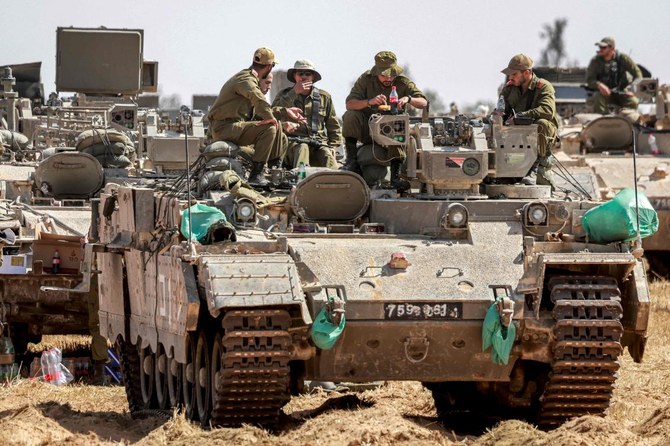
- “There are too many uncertainties over the humanitarian issues,” Stephane Sejourne told Netanyahu
JERUSALEM: An Israeli offensive in Rafah is a bad idea and would not resolve anything in the country’s fight against Hamas, France’s foreign minister told Israeli Prime Minister Benjamin Netanyahu on Tuesday, according to a French diplomatic source.
“It is a bad idea to do it. There are too many uncertainties over the humanitarian issues,” Stephane Sejourne told Netanyahu during a meeting at the prime minister’s office in Jerusalem, the source with direct knowledge of the conversation said.



